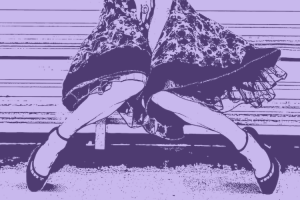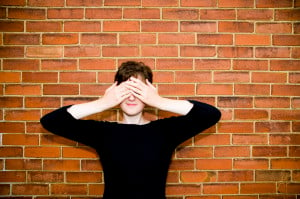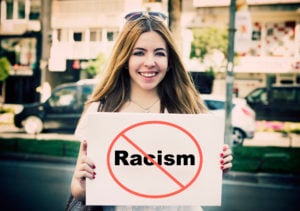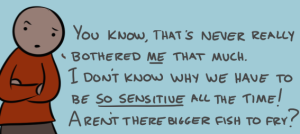
Source: Turkel Taub
Think about the last time you called someone crazy (to their face or behind their back).
What message were you trying to send? I’m sure it wasn’t a positive one.
Was the “crazy” person a woman? I wouldn’t be shocked.
It would be hypocritical of me to shame you for it because we’ve all done it. That’s why it’s important that we discuss it now.
The Connotations of ‘Crazy’
There’s a disconnect between the usage of the word “crazy” and its actual meaning. When calling someone “crazy” in conversation, it usually serves one of three purposes
1. To Other
When you call someone crazy, the implication is that they are separate and somehow entirely different from you.
They’re a deviation from the norm — they’re other.
Othering a group of people is the first step to inequality. And separate isn’t equal.
2. To Dismiss
I find that “crazy” has become a go-to word to describe less-than-perfect family members and ex-partners. When someone in our personal lives is deemed “crazy,” it’s code for “I don’t like them. Don’t take them seriously.”
We use “crazy” to write people off.
3. To Shame
In everyday life, we brand people with a scarlet letter “C” when we do not approve of their behavior.
This implies that so-called crazy people have complete control of their actions and should feel ashamed for stepping outside of the norm.
But here’s the thing: I actually am crazy.
I am one of millions of people living with real mental illness, undergoing real medical treatment, and experiencing the real societal stigma of being “crazy.”
Calling people crazy others them, dismisses them, and shames them.
It also others, dismisses, and shames people like me.
Invisible Ailments
According to the National Alliance on Mental Illness, “a mental illness is a medical condition that disrupts a person’s thinking, feeling, mood, ability to relate to others, and daily functioning.” This definition is broad for a reason: It encompasses a wide range of diverse and serious conditions.
Because there are so many different types of mental illness, I am positive you know someone living with one. One out of every four adults and one out of every five teenagers will experience mental illness in a given year.
You can’t tell someone lives with mental illness just by looking at them. Even mental health professionals have difficulty making precise diagnoses since mental illnesses are invisible and manifest themselves with varying symptoms.
Not to mention, people living with mental illness may not want to talk about their struggles.
Because mental illness is not outwardly physical, many people living with mental illness have their experience questioned, dismissed, or mocked by others. For me, disclosing my mental illness can feel more nerve-wracking than coming out as a lesbian.
You may not see mental illness, but it definitely exists. You may not hear about mental illness, but that doesn’t mean you should ignore it.
Breaking the Taboo
Mental illness is common in the United States — tens of millions of people are affected –– and yet only about 58% of them seek treatment.
Mental illness doesn’t discriminate, and yet our society continues to discriminate against people who have mental illnesses.
There are multiple methods to treat this disease that has killed many, and yet many people don’t even speak up about their symptoms.
To call that a problem would be an understatement.
Clearly, we need to talk about mental illness a whole lot more.
Are these conversations nerve-wracking? Sure. Are they necessary? Absolutely. We have too much to lose if we continue to ignore such an important issue.
Taboo topics get swept under the rug, preventing education and diagnosis.
We can combat the taboo by staying mindful and informed. Talking about this stuff is difficult, but it can save lives.
If you or a loved one are in crisis, there are so many resources at your disposal. There are hotlines you can call or text, as well as organizations that specifically cater to queer people. Suicide is completely preventable, and there is hope. Take it from someone who has been there.
Gender and Mental Illness
Be honest here: Who gets called “crazy” the most?
Women.
When anyone is called crazy, the implication is that “crazy” is a bad thing to be. If crazy is bad, and women are crazy… Well, that’s sexism in action, my friends.
The idea that Women are Crazy has existed throughout the history of civilization, from “hysteria” diagnoses to the Salem Witch Trials and beyond. There are plenty of resources on the feminist blogosphere about the past though.
Let’s talk about how misogyny intersects with mental illness stigma today.
Our culture has accepted this idea that all women are crazy. This discredits women in general and silences the lived experiences of mental illness in both women and men.
Stigma and Treatment
When mental illness is treated with shame, especially in conjunction with gender, it keeps both women and men from seeking proper medical treatment.
If you tell women that they all are crazy, they will accept disordered behaviors and experiences as normal. This can delay a mental illness diagnosis and can keep women from recovery.
Not to mention, when you call women crazy, you are saying that their words, thoughts, and feelings cannot be trusted or taken seriously. If you were ever wondering why modern women seem so insecure and hell-bent on others’ approval, maybe it’s because society keeps questioning their sanity.
If you associate craziness with women, it erases the reality that men live with mental illness. Toxic masculinity already makes it hard enough for men to discuss their emotions and experiences. When you add gender stereotypes into mental illness shaming, you wind up with mentally ill men who refuse important medical care.
One of my favorite public statements made about mental illness was by Jennifer Lawrence in the wake of her Oscar win for Silver Linings Playbook:
“It’s so bizarre how, in this world, if you have asthma, you take asthma medicine; if you have diabetes, you take diabetes medicine; but as soon as you have to take medication for your mind, there’s such a stigma behind it.”
Mental illness is still illness, even if you can’t see its physical manifestations.
We don’t judge people personally for having anemia or ALS, yet our cultural myths and societal discrimination have made it okay to degrade people with mental illnesses, especially women.
But What About the Men?
Mental illness is difficult, no matter what your gender is.
However, when discussing mental illness in an activist space, it is essential to keep privilege and intersectionality in mind.
We need to acknowledge that the intersection of a person’s identities will impact their experience emotionally, socially, professionally, legally, and medically.
For example, trans women of color experience overwhelming inequality and injustice from the doctor’s office to walking down the street, due to the combination of their transgender identity, female-ness, and race.
There are a lot of factors at play that intersect and impact an individual’s experience, and mental illness is definitely one of those factors.
Translation: Men still have privilege, even if they are diagnosed with mental illnesses. You can be marginalized in some ways while exercising privilege in others.
When a woman lives with mental illness, her experience will be different than that of a man.
I’m not trying to tell you my life sucks more than yours. I’m just saying that patriarchy exists at the same time as my Prozac prescription, and I have to navigate both of those things at the same time. All day, every day.
So do millions of other women with mental illnesses.
Mental Illness and the Media
When mainstream media outlets discuss mental illness, it’s usually due to one of the following events:
- A celebrity overdoses, self-harms, has an episode in public, goes to treatment, and/or commits suicide.
- A new movie about upper-middle-class white people dealing with mental illness is nominated for awards.
- A young white man opens fire on a school.
As I’ve mentioned before, we really need to talk about mental illness more often, both in our personal lives and in the media. When mental illness is only discussed in the context of celebrities, fiction, or tragedy, it seems so extreme and separate from reality.
Not to mention, tabloid culture and sensationalistic journalism can and do paint mentally ill people as villains in many of these situations. Most media discourse reinforces the idea that it is somehow okay to other, shame, and/or dismiss “crazy” people — unless they’re favored in the public eye.
Honesty time: Which celebrities who live with mental illness are usually favored by society?
Charming white guys.
The response and media discourse surrounding Cory Monteith’s fatal overdose was certainly different than Amy Winehouse’s. It seemed disgustingly easy for people to joke about Whitney Houston’s self-destructive actions posthumously, but nobody would dare make a similar joke about Robin Williams.
And that, my friends, is why we’re talking about mental illness on a feminist website.
***
I am a feminist because I believe all people deserve equality, equity, respect, and fair treatment.
I believe there is resistance to intersectional feminism because people are afraid. People are afraid of change. People are afraid of being wrong. They’re afraid of going against what their culture and society taught them since birth.
It’s okay to be afraid. It’s not okay to shame people for things they cannot control.
In the case of mental illness, people who are afflicted generally feel enough shame on their own. Every pill is a reminder, saying “You’re not normal.” Sometimes people feel so ashamed or angry about their conditions that they stop taking their medications cold turkey, which is incredibly dangerous.
In the cacophony of negative messages about “crazy” people, so many wonderful people who happen to live with mental illnesses believe they are not worthy of love, success, or life itself.
Don’t think women get enough negative messages about their worth? Try being a “crazy” woman.
Mentally ill people are capable of living long, fulfilling lives. Mentally ill people deserve quality care and treatment, personally and medically. Mentally ill people absolutely deserve love.
I would love to tie up this article with a pretty and hopeful little bow, but the discussion is far from over. This isn’t the end of the conversation about mental illness. There is so much more to be said.
Please continue to talk about mental illness, even when it isn’t a hot topic on your social media newsfeed. These conversations can change lives.
[do_widget id=”text-101″]
Maddie McClouskey is a Contributing Writer for Everyday Feminism. She’s a twenty-something lesbian in New York City and currently writes weekly dating advice pieces for the LGBTQ event app and website SheSeekOnline and was a regular contributor to the sexuality and feminism site ToughxCookies. When she’s not writing articles about gayness, she’s performing stand-up comedy, singing show tunes to her girlfriend and dog against their will, or making up jokes for Twitter @SoundofMaddie. Read her articles here.
Search our 3000+ articles!
Read our articles about:
Our online racial justice training
Used by hundreds of universities, non-profits, and businesses.
Click to learn more




















